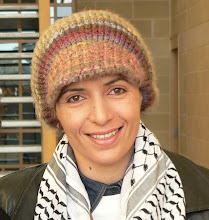ZAHRA, Gaza: Last month, I went to visit my cousin Muhammad Aqil Abu-Shmaleh at the European hospital. Muhammad had been wounded in October in an Israeli missile strike that killed two of its intended targets and a bystander. A piece of shrapnel had plunged into Muhammad's spinal cord and left him paralyzed. He had been at the wrong place at the wrong time.
The life of my family has now been turned upside down as we fight for Muhammad's physical and psychological health. The one comfort we have is the outpouring of concern and support from our neighbors in Khan Yunis, from Israelis of good will, and from friends the world over.
On our way home from visiting Muhammad, my husband Nasser, my 3-year-old son Tariq and I were stuck at the checkpoint between Khan Yunis and Gaza City for more than six hours. This should be a 40-minute trip.
At 6:50 p.m., the Israeli soldiers finally allowed some cars to pass. After five minutes they closed the checkpoint again. The people stuck on the other side of the checkpoint became so angry that they left their taxis and started to walk, challenging the Israelis and their guns. I felt a mixture of shock that people in Gaza were confronting guns with their chests, pride that Palestinians could do such things, when it was all too possible that nonviolent resistance could result in their death, and fear of what would happen.
I had good cause for concern. Israeli soldiers started to shoot toward the people. It was very close and absolutely terrifying. I have lived with war, violence and occupation for all of my 33 years, but will never become accustomed to the horror and the fear.
Adding to my fear was the presence of our son. Close by, a young man was shot in the back of his leg. Incredibly, the people continued to walk. Friends of the youth put him in our car.
The youngster was bleeding and crying and his sobs mixed with those of my child. There is a powerful instinct, which I believe all mothers have, to protect children at any cost. But there, at that time, I felt totally powerless. Yet I was not completely immobilized. I started to shout at people to open the way for our car to move. At the same time I punched the numbers I know all too well for the hospital to send an ambulance.
After 15 minutes of shouting and maneuvering, we got the youth into an ambulance. I discovered I had lost my voice from screaming.
My family's refugee camp, Khan Yunis, was recently attacked twice in one week by Israeli forces. Dozens of homes were demolished, like the hundreds of others in Gaza and the West Bank that have been reduced to rubble over the past three years. Many families came to my parents' home to take shelter. It may be 2003, but in my mind we have traveled back to 1948 when my parents and hundreds of thousands of our people fled their homes.
What more does Prime Minister Ariel Sharon's government want of us? What benefit is gained by the Israeli Army keeping civilians waiting for hours at checkpoints? How can Israel's leaders justify driving us from our homes 55 years ago and then setting their sights and bulldozers on our refugee camps?
How can it be conscionable for good people anywhere that Palestinians are forced to flee from place to place, never to return home?
Having seen my cousin lying in a hospital bed and a teenager bleeding profusely in the back of our family car with my 3-year-old looking on, I realize that there is no place to run and no place to hide in Gaza. My son was not physically harmed, but how can a 3-year-old process what my mind can scarcely comprehend? His psychological processing consists of running around the house, cocking his finger like a gun and shouting, "Tah, tah, tah" to imitate the sound of the Israeli bullets so recently fired in his direction.
When Nasser and I married we thought a just peace was a real possibility. We thought we would be able to offer our children safety and a hopeful future. I went so far as to study Hebrew in Israel. But our hopes for the future of our family and our people have not been met.
The occupation continues because Sharon's government continues to think it can have both quiet and occupation. It cannot.
When you see people walk unarmed into gunfire to reach their destination you realize that they are striving for something more than a physical destination. This is what I believe can be best expressed as the very human desire for freedom. No power and no force can enter our hearts and extinguish it.
That day of Palestinian freedom will be sped up considerably if such spontaneous, nonviolent displays of principle and courage receive more coverage in the United States and elsewhere. We need no U.S. Army to fight for us. We ask only for a commitment to evenhandedness.
We have suffered long enough.
The writer, a doctoral student at Exeter University, Britain, lives in Gaza.
Wednesday, 14 January 2004
Subscribe to:
Posts (Atom)
Palestinian refugees sit at Khan Younis refugee camp


